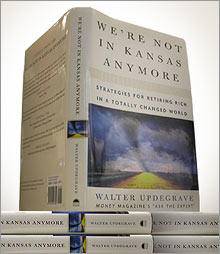|
|
|
|
|
|

|
|
More information on Updegrave's new book.
|
|
|
|
|
NEW YORK (CNN/Money) -
My husband is an active duty soldier who just returned from Iraq. We are a year away from retirement and want to settle in Hawaii. My question is, does it make sense to buy a house now considering how much prices have been surging? Or should we wait a year until retirement and hope that this bubble will burst and housing costs will come down?
-- Tracy Thompson, Honolulu, Hawaii
I agree with you that in many areas of the country housing prices seem to headed for a downfall. Prices have been climbing so fast in recent years that even our esteemed Federal Reserve chairman Alan Greenspan recently warned that the current rate of increase is unsustainable.
And given all this doom and gloom in the outlook for house prices, it's tempting to assume that the best course of action is to wait until the inevitable occurs -- i.e., the bubble bursts -- and then start shopping for a home when prices are lower and bargains abound.
Alas, it's not that simple.
For one thing, while press accounts have put a somewhat dismal spin on the Fed chairman's recent comments about the housing market, if you look at what Mr. Greenspan actually said,it's not that apocalyptic. He warned that "home prices increases will slow and prices could even decrease." Not exactly a prediction of outright collapse.
The slow hiss of a deflating market
And although everyone talks about the bursting of the housing bubble as if it will be a cataclysmic event like dot-com stocks losing half their market value over the course of a few months, that's not the way housing markets work.
Because many home sellers have the option of simply taking their home off the market and continuing to live in it if they can't get the price they want, house prices don't drop as quickly or as severely as stock prices. They tend to be "stickier." So "burst" might not be the right description. What may happen could be more like a slow "hiss" as the air is let out of the bubble.
I don't want to downplay what might happen. In the past, some markets -- I'm thinking Los Angeles, New York and Boston in the late 1980s-early 1990s -- that saw big unsustainable runups in house prices later saw prices decline 10 to 20 percent over periods of a year or longer, and it took another five to 10 years in some cases for prices to regain their peaks.
But this sort of scenario occurred for the most part only in the markets where house buying was a virtual frenzy. The more likely scenario is that house price increases will level off and prices will stagnate or maybe fall a bit. Keep in mind too that prices don't behave uniformly across a city or suburb. Some areas might be harder hit than others. So even if prices stall or fall on average, it doesn't mean that's the case for all neighborhoods.
Don't put your plans on hold
So what does all this mean for your housing search? My feeling is that it would be a mistake for you to put your plans on hold on the assumption that prices will fall and you'll get a much better deal in a year or so.
Who knows, maybe prices in the areas you're looking will continue to climb at their present rate. Or maybe they'll go up but at a slower pace. Or maybe they'll decline but mortgage rates will rise and the lower house price will be offset by a larger mortgage payment.
If you're really looking for a home that you plan to live in for 10 years or more -- and since you view this as your retirement home, I assume that's the case -- then I don't think it makes sense to get too caught up in what might happen to house prices over the next few years.
Not that you want to see prices go down after you buy. No one does. But as long as you don't have to sell at that lower price -- and as long as it eventually recovers, which history shows is overwhelmingly the case -- it's hardly the end of the world.
That said, I certainly don't think you need to rush to make your buy. Take your time looking around and evaluating different neighborhoods and houses. The more you do that, the better the sense you'll get of the market and how much negotiating room you have.
In some markets, the number of houses for sale as been rising recently and they've been staying on the market longer -- both signs that power may be shifting from sellers to buyers. You want to take advantage of that as much as possible.
To sum up, I don't think it makes any more sense to try to time the housing market than it does to time the stock market. So go ahead with your house hunt, but take all the time you need to do a thorough search. After all, this is the house you'll be spending the next 30 years or so of retirement in. So you don't want to make a rushed decision.
Walter Updegrave is a senior editor at MONEY Magazine and is the author of "We're Not in Kansas Anymore: Strategies for Retiring Rich in a Totally Changed World."

|